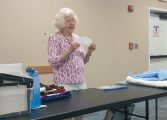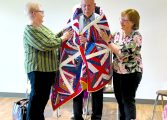By Page H. Gifford
Correspondent
Since she was four Clare Donahue knew she wanted to sing and would often harmonize with television commercials. But it was “Lady Sings the Blues” Billie Holiday that influenced her the most. Holiday’s “Strange Fruit” was recently resurrected to illustrate the current climate in today’s society. Holiday’s songs were always haunting ballads fraught with pain and loneliness, something that Clare said she understood.
“I felt like I was no longer alone in this world. Someone else was in great pain and she turned it into something beautiful. If I hadn’t found Billie, things could have been very bad for me,” she said and added that Doris Day was also a favorite. They were the two singers that vocally had the same strong but mellow style that Clare admired and adopted herself.
Born in the early ‘60s to depression-era parents in Brooklyn, N.Y. Clare is the youngest of three children. Her parents were hard-working people that gave Donahue everything she needed though voice lessons were something she would have to pay for on her own.
“Developing my voice and becoming a professional, without formal schooling, is one of the things I am most proud of. I think, like most of the skills in the arts, it is an endurance game, as long as you love it, who is counting the hours or the cost.” She adds that music saved her life.
At 19, she began her music career as a background singer for a rock band in New York and worked at Warner. She had several groups and artistic projects in New York yet getting them off the ground would require networking and a better understanding of the music business. She eventually landed a job working for Chubby Checker’s manager, Tony DeLauro.
She learned about music management and national touring. She then worked for Doug Breitbart, Esq., calling him a brilliant and ethical man in a very “shady” industry.
“Working with him, the staff, and the artists on that roster was life-changing. From that experience, I went on to form Donahue Management and was one of a handful of female managers in the music industry in New York. She was 25.
“Some very important lessons came very early. I met people who were millionaires and famous and I saw very clearly how neither of those things brings happiness. I was never after money or fame. My childhood was filled with too much pain and trauma. Happiness, I wanted happiness.”
As did her parents. “I think my mother wanted to be independent and saw education as something in which she may have had more options.” Like many men of his generation, her father became an alcoholic. “My father had many unfulfilled dreams and dreamed of what could have been with a drink in his hand. I vowed that that would never be me, either one of those things. I am a fiercely independent person who most people in my life would describe as kind but very courageous. I was intent on giving every dream its chance in my life, no matter the cost. I saw firsthand the cost of not doing so. People handle regret differently, some better, some worse.”
After a near-fatal car crash and a three-month hospitalization, Donahue questioned her life choices and examined her destiny. She decided to get out of what she called the ego-based business of popular music and engage in something worthwhile.
She attended the University of Bridgeport and got her Master’s degree. She then taught elementary school for twelve years, something that was rewarding for her. But it didn’t take long for the music to rise within her, calling her with its alluring rhythms and she
returned to the music industry, but this time, she says older and a tad wiser. She sang torch songs and jazz, fulfilling the destiny she had always dreamed of.
Thirty years ago, an artist friend gave her Julia Cameron’s book, The Artist’s Way. Cameron discusses how to bypass the barriers to an artist’s potential success and why artists sabotage themselves. It was a turning point for Donahue who recognized that artist’s fear failure which stems from low self-esteem and comes from lack of encouragement. She also adds that fear and money play a role in artists putting themselves on the line.
“The Artist’s Way is a great answer to that. Every person needs support to be successful. No one does anything alone. We are all inspired by people, teachers, mentors, nature, other artists, etc.,” she said. “Julia’s work taught me that I always need to find inspiration and encouragement for myself. That age and money are false barriers, there are always people breaking through them. To nurture my artist, to be playful and to just generate work, don’t judge it. Every song you sing or painting you paint should not be weighed and measured against the finest in the field. It is an original work that’s good enough.”
For a New Yorker living in the south was an adjustment, migrating to different areas, from Florida to Georgia, Tennessee, and Alabama, where she felt she could afford to live and work mainly on writing and recording a jazz CD.
“It would take an entire book to express what it was like for a woman born and raised in New York to find herself living five miles from Alabama. First, I felt like I had gone back 50 years in time,” she said. “Secondly, it is a lonely feeling “being the other.” There were days I would pay $10 for a good bagel or real Italian food. More soberly, I could write a thesis on the rural/urban divide in this country while watching a man from Queens, N.Y. run for president and win both the rural vote as well as the Bible Belt. Once again, I came face to face with: we are conditioned to dismiss, whatever we don’t understand.”
After living in the rural South, she vowed never to live in a city again. She came to Fluvanna and Lake Monticello when a friend needed help
“Country folks are the best folks in the world. I am a better musician but more importantly a better human being because of my time in the deep South,” she said. “I always had good manners but thought humility meant meekness. I would have never survived New York or thrived in music being meek. New York is the most competitive music scene perhaps in the world. But I learned humility from their patience with me and their good example. I am forever in their debt.”
She was seeking out musicians to reform her quintet and performed several times with the Randy Johnston and Sentimental Journey Orchestra/Big Band. She was all set for a benefit performance with The Flashbacks when the virus hit. COVID- 9 has left her unemployed like many in the performing arts.
“I have very little fear and don’t worry about money much at all. I have always had what I needed and then some. I am fortunate. I find that the simpler my life is the most creative I am. After all, I have more creative space,” she said. “More is a deadly disease. Greed has become rampant and it is a soul killer for sure. We live in the most beautiful place with nature and wonderful hiking trails. We can still leave our doors unlocked here and people still wave hello. Simple things like that are worth everything to me.”




